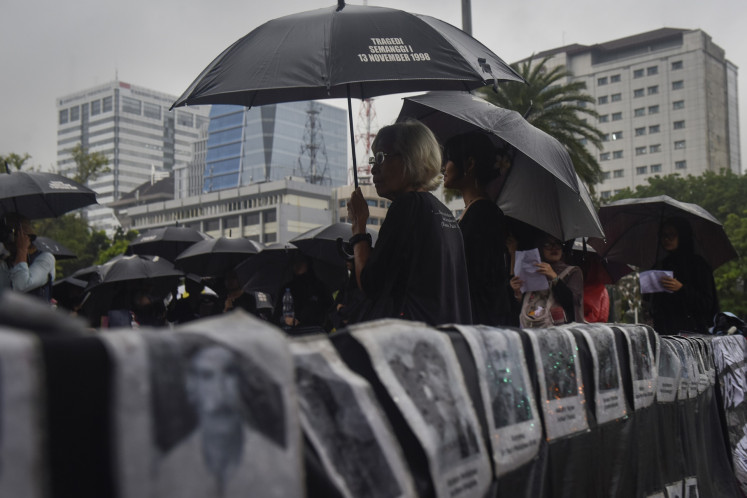Popular Reads
Top Results
Can't find what you're looking for?
View all search resultsPopular Reads
Top Results
Can't find what you're looking for?
View all search resultsCut retaliation value in criminal law
Is the punitive mechanism effective to create public order? Is our criminal justice system based upon retaliation?
Change text size
Gift Premium Articles
to Anyone
L
ate last year Law and Human Rights Minister Yasonna Laoly announced a plan to raise meal allowances for prisoners to Rp 20,000, the average for one person. That means Rp 1.79 trillion this year for around 256,273 inmates, while our prisons can only hold under 126,165 inmates. The huge budgetary spike not only indicates overcapacity of Indonesia’s correctional system, but also unveils another problem of how our criminal justice system addresses crimes.
Recently, the media presented examples of how Indonesia’s legal system copes with crimes through retaliation. From celebrities to public officials, people who reject criticism resort to the criminal justice system to retaliate, such as through reporting “defamation”. Sadly, the system indeed accommodates the intention to punish the “wrongdoers”.
Is the punitive mechanism effective to create public order? Is our criminal justice system based upon retaliation?
A crime is indeed punishable by imprisonment. The idea of imprisoning criminals is to seize their rights the way they have done against their victims. However, we are witnessing a state of "overcriminalization" that leads to "overpunishment" given the myriad of laws that threaten offenders with jail terms.
The overcriminalization recently claimed a victim in teacher Baiq Nuril Maknun who was convicted of defaming her boss after she and her friend circulated a recording of his phone calls to the local education bureau, to prove he had sexually harassed her. Although it was her colleague who circulated the recording publicly, the female teacher was charged under the Electronic Information and Transaction Law (ITE), which draconian contents have consistently been used as a weapon to silence critics.
Another victim of overcriminalization is, like him or not, musician-cum-politician Ahmad Dhani who has been convicted of hate speech and sentenced to 18 months imprisonment. Dhani was also charged under the ITE Law.
Worse, the House of Representatives is now deliberating a bill on music, originally drafted to protect musicians’ property rights, but could criminalize musicians whose works are deemed unlawful.
This phenomenon was depicted by Douglas Husak, a professor at Rutgers University. In his 2008 book titled Overcriminalization: The Limits of Criminal Law, he casts doubts over excessive use of criminal punishments to achieve a better social order or reduce crime rates. In Indonesia’s context, even capital punishment has failed to curb drug abuse crimes. Despite a string of executions of drug dealers since 2014, drug trafficking and abuses have remained rampant. Harsh penalties have not significantly decreased corruption cases either.
A criminal justice system that emphasizes punishments as a mechanism to deter unlawful conducts does not uphold the real value of justice as in the case of Indonesia.
Overcriminalization in the country apparently shows that our criminal law system leans to the retributive theory. Other criminal punishment theories are utilitarian -- intended as a means of social defense and protecting society; another is the combination theory that comprises preventive goals.
The retributive value of a criminal law system is not only obsolete, but it is also not useful to achieve public order. Its ineffectiveness is because its goal is merely to avenge the criminal act, a legal “eye for an eye”. Regulations of criminal punishment have existed just because criminal offenses exist as well.
The core problem of overcriminalization is caused by the many legal provisions for criminal punishments for every single unlawful act. Yet we have no guarantee that the criminal sentence is always effective to cope with every conduct against the law. The depiction of current ineffectiveness of criminal law not only exists in our Criminal Code and its current draft amendment, but also in other legal provisions.
One attempt to update the criminal penalties in the revised Criminal Code draft is a proposal of social work sentence; however it would need special requirements and mechanism including the institution to operate it.
Another issue to be revised is the death penalty. The International Covenant on Civil and Political Rights (ICCPR), ratified by Indonesia in 2005, ruled that the death penalty should only apply to the most serious crimes, which in Indonesia must be defined by law.
Unfortunately, the Criminal Code draft amendment still rules about death penalty, which shows that the retaliation value still exists in the criminal legal system. Instead of abolishing the death penalty sentence or even clarifying the section in line with the ICCPR requirements, the death penalty sentence is still considered an effective way to punish crime.
Reforming the provisions might reduce the chance of some parties abusing those laws to suppress others, mainly the weak and the poor, as evidently shown in defamation and blasphemy cases in recent years. A handful of those cases actually failed to satisfy requirements to fall under the criminal conducts, but public pressure seems to have contributed to convictions and imprisonment of the defendants.
Whoever wins the legislative and presidential elections this April should focus on legal reform. The government can pass many laws, but reforming the criminal legal system is urgent. This criminal law reform would not only help to reduce problems in Indonesia’s prison, but also the whole criminal justice system, contributed by overcriminalization.
***
The writer is a lecturer in law at University of Merdeka Malang, Indonesia. He is also studying for Doctor of Juridical Science degree at Indiana University Bloomington at Maurer School of Law, the United States, supported by a Fulbright Scholarship.










